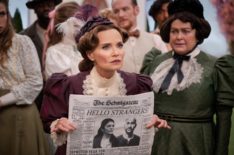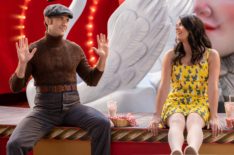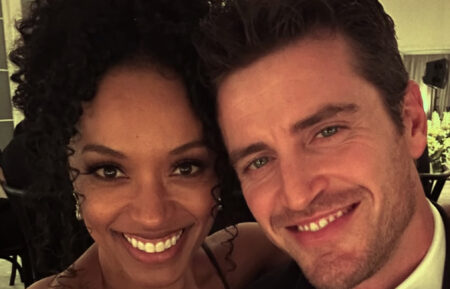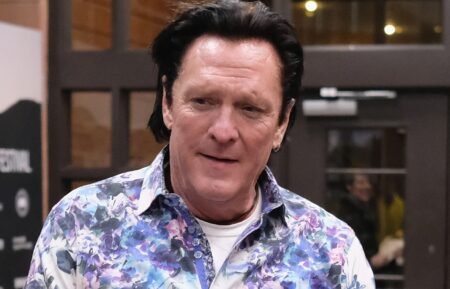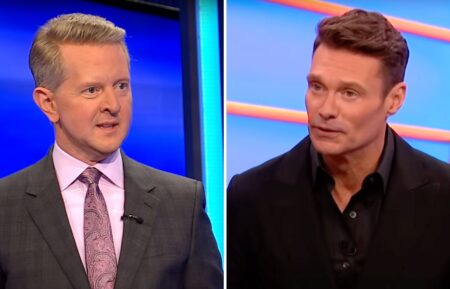‘Schmigadoon!’ Creator Breaks Down the Musical References in the Songs
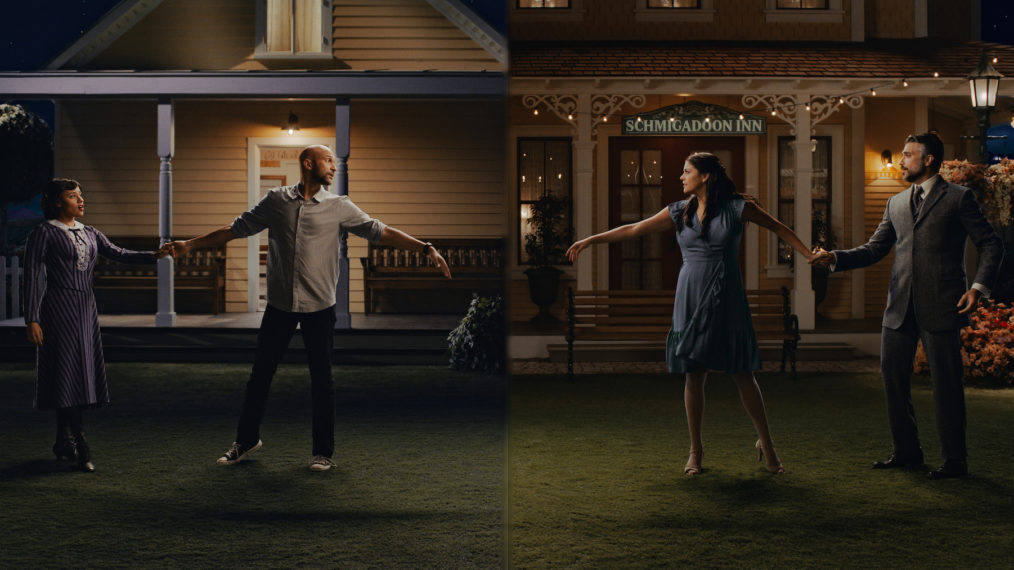
The ebullient new Apple TV+ series Schmigadoon! might be aimed squarely at musical theater fans, but it’s also amazingly the kind of show that will please people who cringe at the perky, bursting-into-song conventions of the genre.
The show, in which a backpacking couple wind up trapped in a town where everyone behaves as if they’re in a golden-age movie-musical, features dialogue, commentary and lyrics that lampoon the silly and heightened tropes of the form. (“It’s like The Walking Dead was also Glee!” Keegan-Michael Key’s Josh exclaims.) But at the same time, it isn’t afraid to poke fun at people who mock musicals for their heightened realism. (“Well, you seem okay with magical hammers that come back when you call them,” Cecily Strong’s Melissa replies after Josh complains that “people don’t just burst into song in real life.”)
In writing songs that largely pay homage to the Broadway musical, Cinco Paul, who cocreated the show with Ken Daurio and wrote the score, says he was aiming for the highest form of parody.
“To me, it was about making these songs feel as if they really could have existed in a real musical,” Paul says. “Everybody in this town, they are sincerely singing their feelings. And putting too many jokes in the songs is a betrayal of that in a way. The more real they felt, the better the comedy and everything was going to play.”
The idea for the series came to Paul almost 25 years ago; the title and magical premise was inspired by the bonkers Lerner and Loewe musical Brigadoon, which was transformed into a 1954 Vincente Minnelli movie starring Gene Kelly. In the film, two friends on a game-hunting vacation stumble upon a mystical village in the Scottish Highlands.
Paul eventually pitched the idea to Andrew Singer, who runs Saturday Night Live honcho Lorne Michaels’ production company; Singer suggested the duo should be a couple in a long-term relationship who have hit a rough patch and are facing some strain. “It should be about making a relationship work. That was the lightning bolt that unlocked it for me,” Paul admits. “There’s not enough movies about a couple that’s deep into [a relationship] and how hard it is to make it work.”
Having grown up listening to cast albums such as Camelot and Guys and Dolls and playing piano (and even acting) in high school musicals, Paul jokes that he’s been “preparing for Schmigadoon! my whole life.” Still, before he set out to write the songs, he played through piano scores for classic musicals by Rodgers and Hammerstein, Lerner and Loewe, Frank Loesser, and others. “I thought, if this is going to be authentic, I want to emulate those tendencies the best that I can,” he says.
Here, Paul discusses the musical touchstones for key songs featured in the first five episodes.
Episode 1: “Schmigadoon!”
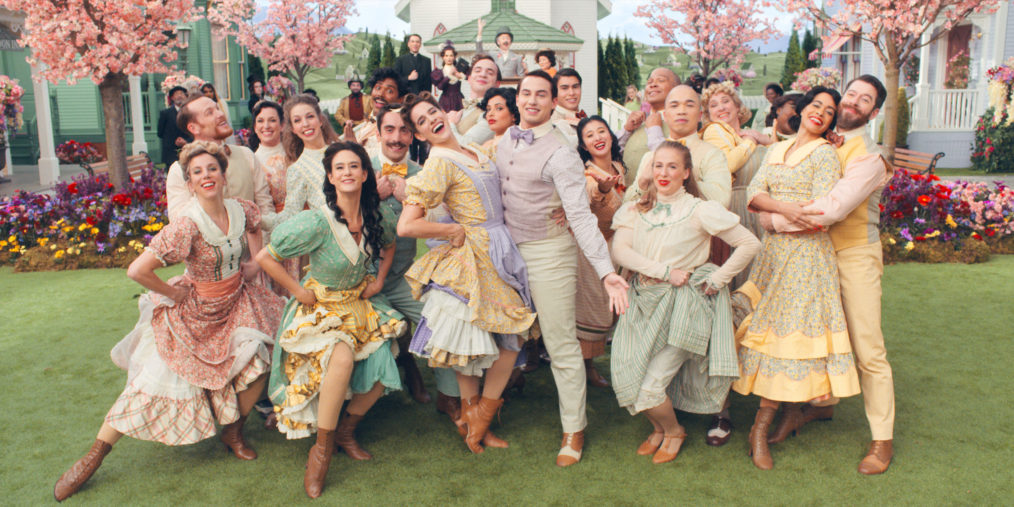
Apple TV+
While the series name and premise are a takeoff on Brigadoon, its big opening number, “Schmigadoon!” is a direct homage to the rollicking, roof-raising title song in Oklahoma!, which is actually a second act show-stopper in the oft-revived 1943 musical. With an earworm melody, huge dancing chorus and singing the name of the title locale with an extra-elongated vowel sound (in Schmigadoon! it’s the “i” instead of the “O” in Oklahoma!), the song spoofs the genre’s idyllic (and simplistic) depiction of small-town life.
Paul credits Doug Besterman and David Chase, who did the orchestrations and arrangements, for the song’s success. “I said, ‘Let’s go to town with the ending and extend it as much as possible,’ and their eyes lit up. So they added the ‘Schmiga, Schmiga, Schmiga’ [lyrical repetition] and then spelling out the name of the town in the song. It [originally] went even longer [but] I realized there’s a fine line between irritating Josh and irritating everybody watching!”
In Episode 1, Melissa meets and is romanced by the town’s resident “rapscallion,” Danny Bailey (Aaron Tveit), a direct parody of Carousel leading man Billy Bigelow. Musicals, Paul explains, often have an “I’m not going to fall in love,” song, so he wrote Bailey the tune, “You Can’t Tame Me” in which the character sings about his perpetual bachelor destiny and his longtime refusal to settle down. Thematically, the first part of the song, Paul says, is a nod to “I’m a Bad, Bad Man” from Annie Get Your Gun. Then it turns into the “If I Loved You” from Carousel, which chronicles Billy and millworker Julie Jordan’s growing attraction. Musically, the song also pays tribute to the lilting “Surrey With the Fringe On Top” from Oklahoma!
As Melissa and Josh attempt to order lunch, the waitress Betsy (Dove Cameron) asks if they’d like to try the local favorite “Corn Puddin'” —which leads to the townsfolks breaking into a toe-tapping yet completely puzzling tune about their love for the famous local dish. The folky number is a homage to “It’s a Real Nice Clambake” from Carousel, the type of jaunty tune that’s pointless to the plot and doesn’t flesh out any of the characters, but remains a joyous song-and-dance number.
“It was really about coming up with a song [that would] leave Josh befuddled and be like, ‘Why are you singing about this food item?'” Paul also cites “Shipoopi,” the famous nonsense Buddy Hackett song from The Music Man that “brings everything to a crashing halt” in that musical. “Ironically, though, in our show it really moves the story forward because it pushes Josh to say, ‘Okay, we need to leave.'”
Episode 2: “Lover’s Spat”
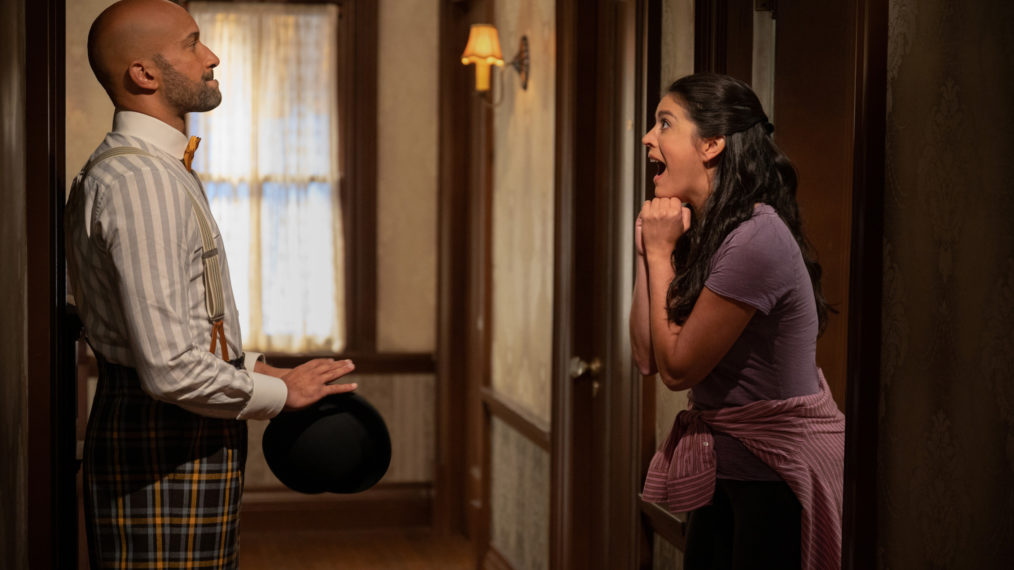
Apple TV+
At the bridge out of town, Melissa and Josh argue about the possibility that their relationship isn’t true love and realize they’re stuck in Schmigadoon until they find it. The townspeople sing and dance to a high-spirited anthem, “Lovers’ Spat” as their breakup unfolds. The jaunty, upbeat song contrasts with the contentious situation.
The bouncy intro echos the opening of “There’s Nothing Like a Dame” from South Pacific. “We’re in what I call Rodgers and Hammerstein polka mode,” Paul says. He cites the rousing “Once A Year Day” from The Pajama Game as an influence, as well as “an obscure song” from Rodgers and Hammerstein’s 1955 musical flop Pipe Dream, “The Party That We’re Gonna Have Tomorrow Night.” And the barbershop quartet is a nod to the feel of Meredith Willson’s The Music Man.
When Melissa runs into Mayor Menlove (Alan Cumming) in the woods, he tries to cheer her up after her split from Josh. Then he breaks into a soaring ballad of melancholy yearning, “Somewhere Love Is Waiting For You.” As he dreamily croons, Melissa realizes he’s a closeted gay man struggling with his sexuality, a little nod to the homoerotic subtext often laced through Golden Age musicals. The operatic song’s key musical influences are two tunes from South Pacific—Emile’s aching “Some Enchanted Evening” and Emile and Nellie’s budding-love duet “Twin Soliloquies.” Thematically, Paul says the tune is in the mode of “the classic mentor’s advice song or cheer up song”—”More I Cannot Wish You” from Guys and Dolls and “Climb Every Mountain” from The Sound of Music. Plus, “It allows Mayor Menlove to reveal a little more than he would feel comfortable with just speaking.”
Melissa gets her first big song with the jazzy “Enjoy the Ride” in which she lets loose and embraces her bad-girl side in a duet with Danny outside the Tunnel of Love. (Dove Cameron’s waitress Betsy gets to croon a couple of hilariously funny verses of her own, filled with sexual innuendo, in a scene with Josh.) Paul says the song’s content echoes “If I Were a Bell” from Frank Loesser’s Guys and Dolls. But musically it’s inspired by another Loesser classic, “Baby, It’s Cold Outside,” a longtime holiday favorite that was first used in the 1949 musical-comedy “Neptune’s Daughter” (and won the Oscar for Best Original Song).
Episode 3: “Cross That Bridge”
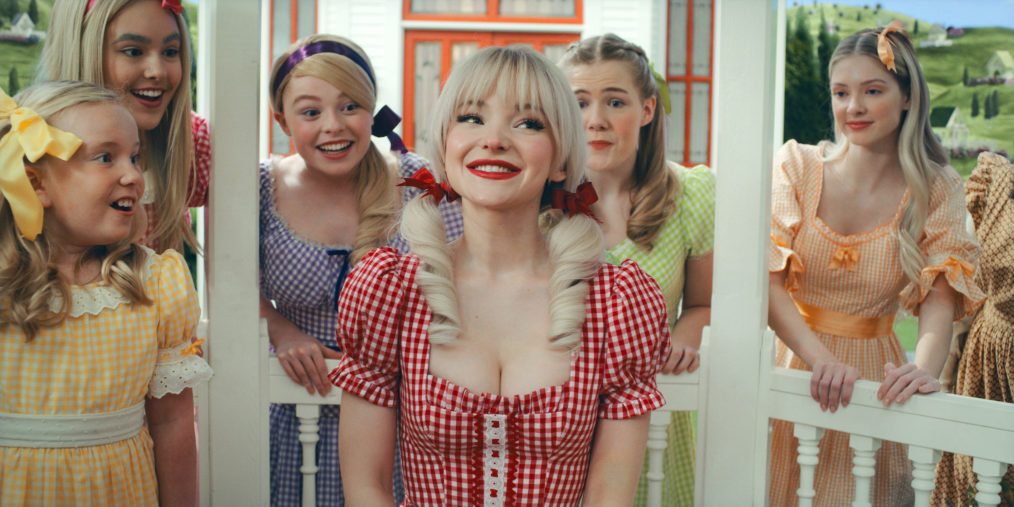
Apple TV+
Melissa bonds with the sweet, patient Florence Menlove (Anna Harada), the mayor’s wife, who loves her brooding yet caring husband, but laments how distant he can be and the “long walks” he loves to take. “There’s often the song of a woman singing about a man and how she loves him in spite of his flaws,” Paul says. “You try to find the well that these musicals always go to, and then play with that and twist it and do it in a different way.” The title of her song, “He’s a Queer One, That Man O’ Mine“ is a nod to “You’re a Queer One, Julie Jordan” from Carousel. But the key stylistic and thematic inspiration is another song from Carousel—Julie’s “What’s the Use of Wond’rin,'” along with the ballad “Something Wonderful” from The King and I, “My Man” from Funny Girl and “Can’t Help Lovin’ That Man” from Porgy and Bess. “There are all of these songs where the women are like, ‘Well, I guess I love him even through all of these horrible things he does.'” So I decided to turn it on his ear because [Florence] really loves her husband…except for one thing”—he’s a closeted gay man. Paul’s favorite lyric? “Show me any other man more tender or expressive/I only wish that nightly he were slightly more aggressive.”
At the end of the third episode, Josh ropes most of the town’s women to the bridge to find one who might qualify as his true love—and earn his ticket out of this godforsaken town. There, the ladies sing the jaunty “Cross That Bridge” urging each other to find a man and get that wedding ring before it’s too late. “It plays with the idea of many of these women in these musicals desperately want to get married,” Paul says. “One of my favorite lines in the whole series is, ‘All the gals who dilly dally, Wind up dying in an ally…'” Paul says he loves female-led ensemble numbers, and “I’m Gonna Wash that Man Right Out of My Hair” from South Pacific was a particular inspiration here, along with two of his favorite musical theater songs of all time, both by Frank Loesser—”Sit Down, You’re Rockin’ the Boat” from Guys and Dolls and “Brotherhood of Man” from How to Succeed in Business Without Really Trying. “They’re rousing, gospel-tinged, 11 o’clock numbers,” Paul says.
Episode 4: “Suddenly”
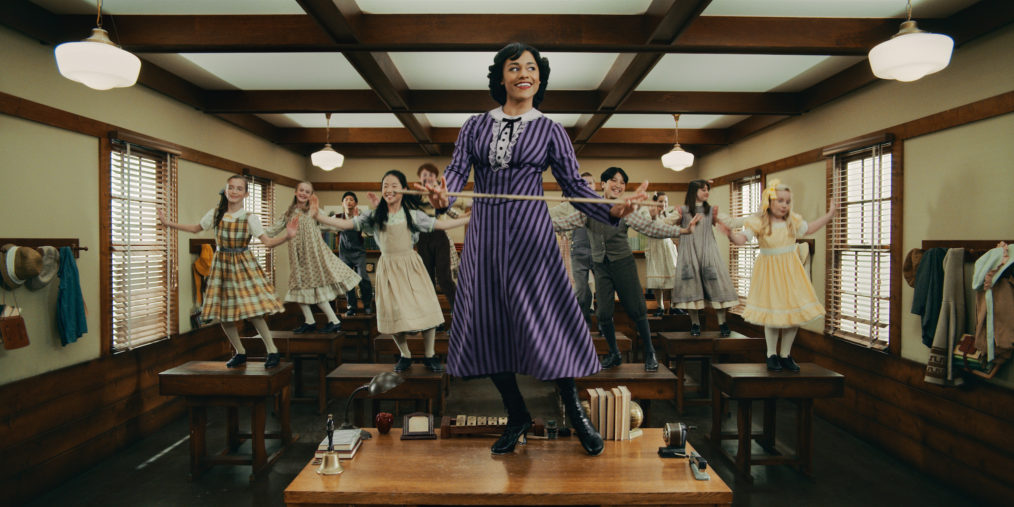
Apple TV+
Ariana DeBose (Hamilton, West Side Story) plays smart yet sweet local schoolmarm Emma, the only woman in town who Josh hasn’t tried to cross the bridge with. He thinks she may be The One and he actually falls for her a bit. A nod to Marian the librarian from The Music Man and Anna from The King and I, Emma is an enlightened, independent-minded woman who helps Josh come to some realizations. And he helps her open up and reveal her long-buried secret about her younger brother, Carson, a parody of The Music Man‘s Winthrop Paroo (with his adorable lisp and penchant for popping up all over town to shout out various plot turns). Emma’s big song, “With All Your Heart,” featuring kids dancing on school desks, is in the mode of “Getting to Know You” from The King and I. The song’s melody came to Paul in the middle of the night, and he immediately left his bed and went to the piano to write it. He calls its music and theme a “mishmash” of Sammy Cahn and Jimmy Van Heusen’s “High Hopes” from the Frank Sinatra film A Hole in the Head, and Richard Adler and Jerry Ross’s “Heart” from Damn Yankees, with elements from Mary Poppins and Thoroughly Modern Millie tossed in.
After Melissa gets a job as a nurse for handsome Doc Lopez (Jaime Camil), she tries to help out a pregnant but unmarried young woman, Nancy, whose baby daddy is Seaman Freddy Drakes. “I’ve got so many questions and no one to ask. For instance, where does the baby come out? I feel like there are a couple of options…but both seem crazy!” Nancy laments. When Melissa tells a shocked Nancy where the baby will emerge, Freddy comments, “Ma’am, I don’t even use language like that.” That prompts Melissa to sing “Va-Gi-Na,” a parody of Julie Andrews teaching the kids to sing in “Do-Re-Mi” from The Sound of Music. “I felt there was a freedom to go directly into the parody world with this because it’s coming from Melissa’s character. It’s her realizing ‘Hey, I’m in a musical, I know what the tropes are, I’m going to do a song right now.’ It seemed perfect that she’s an OB-GYN, so she’s singing a teaching song. I knew Cecily would kill it!”
Josh and Melissa’s budding new romances with Emma and Doc Lopez converge at the end of the episode in the ballad “Suddenly” featuring the couples dancing with each other in the moonlight, filmed in split-screen. Musicals, Paul says, often feature a tune that seals the deal for two characters who’ve come to the realization that they’ve fallen in love. But instead of having the two lovers sing to each other, the duet winds up being between Emma and Doc Lopez, who confess their romantic feelings for Josh and Melissa. Paul says that scene and the song are directly inspired by “Something Good” from the moonlight gazebo scene between Maria and Captain Von Trapp in The Sound of Music. There’s also shades of “Some Enchanted Evening” from South Pacific and “I’ve Never Been In Love Before” from Guys and Dolls.
Episode 5: “Tribulation”
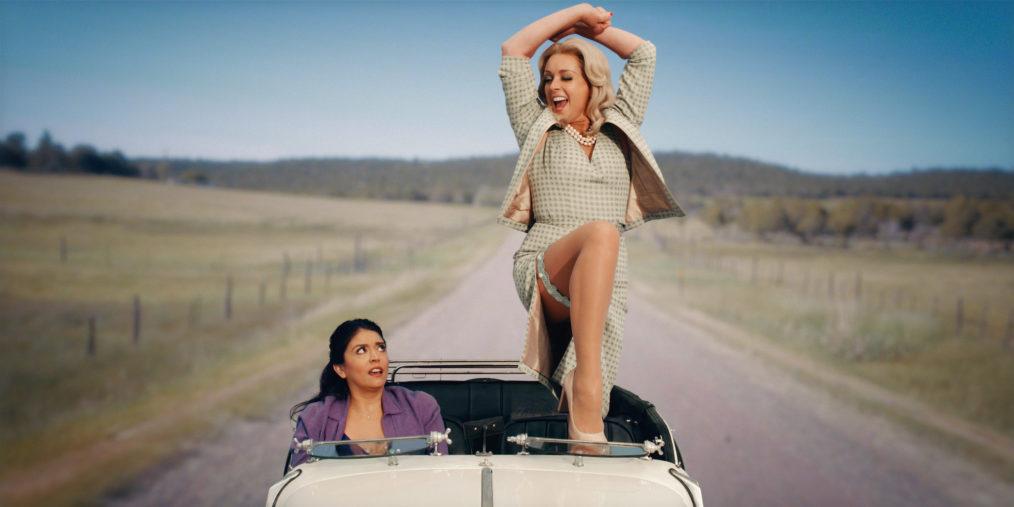
Apple TV+
An inspired homage/parody of “Ya Got Trouble” from The Music Man, “Tribulation” is a showcase for Kristin Chenoweth’s Mildred Layton, the town scold and head of the puritanical group “Mothers Against the Future.” “[‘Ya Got Trouble’] to me is a masterpiece,” Paul says. “It’s like nothing that ever existed before.” Mildred has been warning the townspeople about Josh and Melissa, these bad-news outsiders with their loose, “big city” morals, and the danger their newfangled ideas pose to the town’s wholesome values. In the tune, she sings about the “strife and tribulation” that’s infiltrated Schmigadoon since they arrived. “Is that what our town’s become? Is that the future we want for our children?” she sings in a patter-like cadence, “Promiscuity and depravity! Interlopers interloping, with hearts colder than the hinges of hell!”
“It was really fun to go online and do the research and find all these archaic terms to put in the song, like ‘tommyrot and flapdoodle,’ ‘jiggery pokery’ and ‘milk going sour unstrained in the springhouse.’ I wanted it to be authentic.”
Chenoweth delivers a tour-de-force performance that was filmed in a four-minute single take, at the insistence of director Barry Sonnenfeld and choreographer Christopher Gattelli, with a Steadicam following her around the town square. “She was cursing me for a while because she said, ‘This is 18 pages and there are no rhymes. How am I supposed to learn this?’ We had set aside the whole day to film the scene, but I think she nailed it on the third take.”
Another Broadway-turned-television star Jane Krakowski pops up in the fifth episode as the blonde, pearl necklace-draped Countess, Doc Lopez’s fianceé. She’s a direct spoof of The Baroness, Captain Von Trapp’s girlfriend and romantic rival to Maria, in The Sound of Music. Since the series aimed to deconstruct and reimagine dated elements from classic musicals, Paul and the writing staff realized that they should give the Countess some brains and agency. So even though she still looks like a wealthy socialite, they turned her into a successful scientist who invented stainless steel! Writer Allison Silverman, Paul explains, had penned a hilarious monologue about all the guys in the Countess’ life who had left her (“Powerful men can never resist the help,” she says). So in the episode, her character sings the jazzy, Big Band-style “I Always, Always, Never Get My Man.”
“I saw it as a great opportunity for a Cole Porter-style song with a more sophisticated feel. This is very much a parody of ‘Always True to You in My Fashion’ from Kiss Me, Kate. It also has one of my proudest lines in the show—’There was Tex who traded stocks, hired a girl to darn his socks/When Texy’s socks led to sexy talks/I was out on my can!’ It’s my lesser attempt, but it’s definitely a nod to [Porter’s] incredible wit and clever lyrics.”
While Krakowski killed her song-and-dance performance—which takes place inside a convertible sports car—the Countess is still a villain. “I mean she pulled a gun on our protagonist and leaves her stranded in the countryside,” he says. “And she is a Nazi!”
Schmigadoon!, Fridays, Apple TV+

